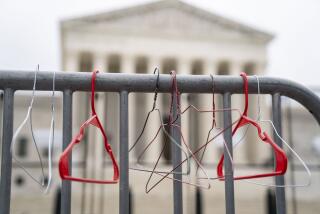Senate Panel OKs Nomination to Court
WASHINGTON — Hoping to resolve an unusual mother-son controversy, a Senate panel Thursday cleared President Clinton’s nomination of UC Berkeley law professor William A. Fletcher to join the U.S. 9th Circuit Court of Appeals but with the understanding that his mother will take senior status on the same court.
Judge Betty B. Fletcher, a veteran liberal jurist from Seattle, offered last month to take the partial retirement as a means of winning her son’s confirmation.
On a 12-6 vote, the Judiciary Committee approved William Fletcher’s nomination and sent it to the Senate floor. It faces an uncertain future there, in part because the Republican leadership is in flux.
Outgoing Majority Leader Bob Dole (R-Kan.) has made “liberal judges” a campaign theme and so far this year the Senate has confirmed only three Clinton judicial nominees, all on Jan. 3.
Administration officials said 42 judicial nominations are awaiting approval in the Senate.
The only controversy, however, has centered on William Fletcher and a previously obscure 1887 anti-nepotism law. It says that “no person shall be appointed to or employed . . . in any court” who is related “within the degree of first cousin to any justice or judge of such court.”
“It means,” said Sen. Joseph R. Biden Jr. (D-Del.), “if you’re a judge, you can’t appoint your brother-in-law as the bailiff and your wife as the court stenographer.”
But committee Republicans said the clear language of the law forbids Fletcher’s appointment to the same court where his mother has served since 1979.
“I believe Congress should follow the law,” said Sen. Strom Thurmond (R-S.C.) in voting against the nomination. If Judge Betty Fletcher assumes “senior status,” she can continue to decide a full load of cases, he said. “In my view, this is not adequate” to resolve the conflict, Thurmond said. “She may not wish to retire at this time and I can appreciate her desire,” the 93-year-old senator said of the 73-year-old judge.
Committee Chairman Orrin G. Hatch (R-Utah) characterized his approach as a reasonable compromise. On the one hand, he agreed with his conservative colleagues that the anti-nepotism law applies to presidential appointments. However, he voted with Democrats to approve the nomination on the belief that Judge Fletcher’s willingness to take senior status removed the conflict.
Sounding a bit defensive, Hatch said he had not “conjured up” the anti-nepotism law for political reasons to block a Clinton nominee. However, he opened the session by alluding to the 9th Circuit Court’s liberal reputation.
“We want to bring some balance to that court, after watching Mr. Reinhardt and a few of the others,” he said, referring to Judge Stephen Reinhardt of Los Angeles, the court’s most prominent liberal.
The 9th Circuit Court, whose jurisdiction covers California and eight other western states, has 24 active judges and 13 others on senior status. A judge on senior status cannot vote in the rare instances when the full court hears a case, but otherwise can function the same as an “active” judge.
Hatch said he is troubled by the notion of having two close relatives sit on a court that serves 50 million Americans.
“It isn’t right,” he said. “It smacks of elitism and a close familial control of the judiciary.”
At that point, Sen. Edward M. Kennedy (D-Mass.) interrupted. “I don’t know what’s so wrong with a familial concentration of power,” joked the senior member of the Kennedy political dynasty.
More to Read
Get the L.A. Times Politics newsletter
Deeply reported insights into legislation, politics and policy from Sacramento, Washington and beyond. In your inbox three times per week.
You may occasionally receive promotional content from the Los Angeles Times.











